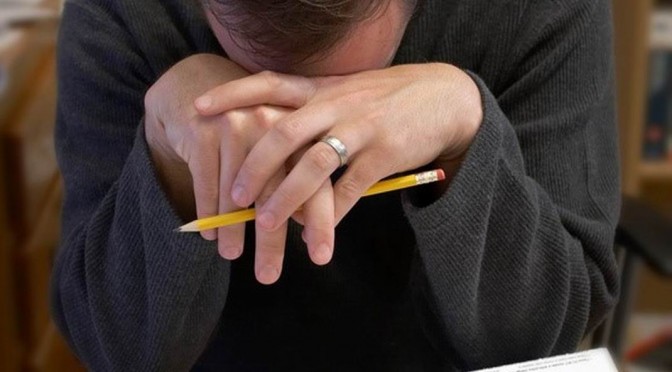 So if you don’t feel like it now, when will you?
So if you don’t feel like it now, when will you?
Here’s the problem: your mood won’t match your work, and the less work you do, the less your mood will guide you towards doing your work. The only way you’ll get to it now is through Procrastinator’s Panic, which isn’t the best thing.
Research proves that last minute work is less effective, less thorough, and more stressful than work completed on time and with consistent effort. It comes down to control: if you rely on the “cram” or the last-minute surge, you’re letting the work control you, not the other way around.
Cookies for nothing?

What’s happening is that when you put off a responsibility or goal in exchange for something more pleasurable and relaxing, you are doing what is known by procrastination experts as “Giving in to feel good” (see this blog post by Dr. Timothy A. Pychyl.)
Avoiding a responsibility is emotionally pleasing and relieves stress, However, you are only rewarding yourself for not doing something. Not good. Especially when long term consequences will result (lower grades, arguments, stress) in exchange for a couple hours of chatting or TV.
Dr. Pychyl writes:
Procrastinators will tell you that the task they’re facing (avoiding) is difficult, and it creates bad feelings like anxiety or general emotional distress. Putting off the task at hand is an effective way of regulating this mood. Avoid the task, avoid the bad mood. This is what Tice and Bratslavsky refer to as “giving in to feel good.” We give in to the impulse to walk away in order to feel good right now. Learning theorists would even add that we have now reinforced this behavior as the decrease in anxiety is rewarding.
Save the good stuff for last!
When I was a kid, I learned to eat the bad tasking food like (yuck) broccoli FIRST to get it out of the way. That way I’d have only the good tasting, fun food left at the end, and I wouldn’t have to worry about finishing my plate.
You might try that idea w/ your homework prioritization: swallow the bad tasting work first. Push through it, and remind yourself that you have the more enjoyable tasks afterwards. A couple things may follow:
- You will have at least started your difficult work.
- You will not be under-estimating the time you may need for the difficult work. When you put it off for last, you’re just trading a little “mood repair” for not having to face what’s difficult or unclear, and you likely will find yourself running out of time or energy to get it done later. Besides, it’s easier to cram in the easy stuff later if you run out of time.
Just start it!
Nike almost got it right. But how are you going to “just do it” if it is overwhelming, scary, and unclear to you how you will ever finish.
Dr. Pychyl has a better way. “Just start it,” he says. If you start, you are no longer procrastinating, and once you start it you will see things more clearly, you will build your confidence, and you will go from wanting to do nothing to feeling good about doing something. The more work you do, the better and more accomplished you will feel.
Knowing this won’t make you do your work, but you must know it in order to break your cycle of putting off work because you “don’t feel like it.”
Above all, you can do it, but only if you stop rewarding yourself for not doing it. The less you do, the less you will do. The more you do, the more you will get done. Simple enough?
Good job! Now, check out:
How to stop procrastination: Ten (10) tips for getting your work done
Seek also this article in the Wall Street Journal for more on these ideas: To Stop Procrastinating, Look to Science of Mood Repair. See also Dr. Pychyl’s blog, “Don’t Delay” on Psychology today. He’s great!
– Michael
